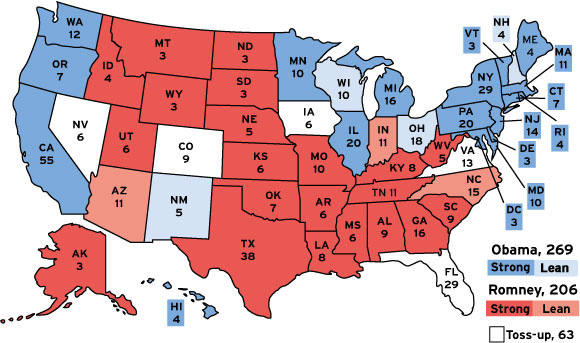Obama Headed for 2012 Win?
Romney needs a big shift in momentum to close the gap, but time is running short.

Profit and prosper with the best of Kiplinger's advice on investing, taxes, retirement, personal finance and much more. Delivered daily. Enter your email in the box and click Sign Me Up.
You are now subscribed
Your newsletter sign-up was successful
Want to add more newsletters?

Delivered daily
Kiplinger Today
Profit and prosper with the best of Kiplinger's advice on investing, taxes, retirement, personal finance and much more delivered daily. Smart money moves start here.

Sent five days a week
Kiplinger A Step Ahead
Get practical help to make better financial decisions in your everyday life, from spending to savings on top deals.

Delivered daily
Kiplinger Closing Bell
Get today's biggest financial and investing headlines delivered to your inbox every day the U.S. stock market is open.

Sent twice a week
Kiplinger Adviser Intel
Financial pros across the country share best practices and fresh tactics to preserve and grow your wealth.

Delivered weekly
Kiplinger Tax Tips
Trim your federal and state tax bills with practical tax-planning and tax-cutting strategies.

Sent twice a week
Kiplinger Retirement Tips
Your twice-a-week guide to planning and enjoying a financially secure and richly rewarding retirement

Sent bimonthly.
Kiplinger Adviser Angle
Insights for advisers, wealth managers and other financial professionals.

Sent twice a week
Kiplinger Investing Weekly
Your twice-a-week roundup of promising stocks, funds, companies and industries you should consider, ones you should avoid, and why.

Sent weekly for six weeks
Kiplinger Invest for Retirement
Your step-by-step six-part series on how to invest for retirement, from devising a successful strategy to exactly which investments to choose.
A second term in the White House for President Barack Obama is beginning to feel inevitable.
Road to the White House: Deep Mud Ahead
It’s not impossible for Republican challenger Mitt Romney to win, but he’ll need a dramatic reversal to make it happen -- a huge error by Obama in one of three debates scheduled for October, or more bad news about the economy that either keeps many Democrats home on Election Day or moves undecided voters toward the GOP.
Based on an analysis of poll results, voting patterns and other data, Kiplinger gives Obama 21 states and the District of Columbia, for a total of 269 electoral votes. That’s just one short of the 270 needed to win four more years in the White House.
From just $107.88 $24.99 for Kiplinger Personal Finance
Become a smarter, better informed investor. Subscribe from just $107.88 $24.99, plus get up to 4 Special Issues

Sign up for Kiplinger’s Free Newsletters
Profit and prosper with the best of expert advice on investing, taxes, retirement, personal finance and more - straight to your e-mail.
Profit and prosper with the best of expert advice - straight to your e-mail.
We give Romney 24 states, putting 206 electoral votes in his column.
Five states, accounting for 63 electoral votes, are toss-ups: Florida, Virginia, Colorado, Nevada and Iowa.

If no states shift from one candidate to the other, Romney would have to win all five toss-ups to leave him and Obama in a 269-269 tie. In the case of a tie, picking the next president would fall to the House of Representatives, where each state gets to cast one vote for president. Under such a scenario, Romney would win, since Republicans will control a lion’s share of congressional delegations in 2013.
But that’s a long shot; Romney is unlikely to win all of the states that are, for the moment, too close to call. Obama won them all in 2008, and momentum seems to moving his way in several of them now, including Florida, the biggest prize in the bunch, with 29 electoral votes. If Obama wins there, the election could turn into a rout. On the other hand, if he won the smallest toss-up prize -- six votes in Iowa or Nevada -- and Romney won the rest, Obama would claim a narrow victory.
Obama’s strongholds include the Pacific Coast, the Mid-Atlantic and New England. Five electoral giants alone -- California, New York, Pennsylvania, Illinois and Ohio -- account for 142 electoral votes, more than half of the incumbent’s total.
Romney’s strength is concentrated in the South, the Plains states and the Mountain states. But Texas, with 38 electoral votes, is his lone big prize. About three-quarters of the states aligned with him award nine or fewer electoral votes.
Aside from the five up-for-grabs states, Romney’s best hopes for gains are Ohio, New Hampshire and Wisconsin, the home state of his running mate, Rep. Paul Ryan.
Absent a momentum shift, though, it will be a long, difficult autumn for Romney and his supporters.
Profit and prosper with the best of Kiplinger's advice on investing, taxes, retirement, personal finance and much more. Delivered daily. Enter your email in the box and click Sign Me Up.

-
 How Much It Costs to Host a Super Bowl Party in 2026
How Much It Costs to Host a Super Bowl Party in 2026Hosting a Super Bowl party in 2026 could cost you. Here's a breakdown of food, drink and entertainment costs — plus ways to save.
-
 3 Reasons to Use a 5-Year CD As You Approach Retirement
3 Reasons to Use a 5-Year CD As You Approach RetirementA five-year CD can help you reach other milestones as you approach retirement.
-
 Your Adult Kids Are Doing Fine. Is It Time To Spend Some of Their Inheritance?
Your Adult Kids Are Doing Fine. Is It Time To Spend Some of Their Inheritance?If your kids are successful, do they need an inheritance? Ask yourself these four questions before passing down another dollar.
-
 Kiplinger's 2020 Election Forecast
Kiplinger's 2020 Election ForecastPolitics For nearly a century, The Kiplinger Letter has forecasted the outcome of presidential elections to keep readers informed of what's coming and what it means for them. Here's our call for 2020.
-
 How the GOP Tax Bill May Affect Businesses
How the GOP Tax Bill May Affect BusinessesBusiness Costs & Regulation Corporations would enjoy a lower flat tax rate while individual owners of pass-throughs would also see a lower rate, but with more complex terms.
-
 The Long Slog in Congress After Comey
The Long Slog in Congress After ComeyPolitics Trump's firing of the FBI director ruffled congressional feathers, but not enough to spur an independent investigation into Russian meddling in the 2016 U.S. election.
-
 Trump’s Tax Reform Plan Faces Tough Challenges
Trump’s Tax Reform Plan Faces Tough ChallengesPolitics A one-page outline isn't enough to satisfy a Congress interested in the details — and protecting constituents.
-
 Trump's Agenda and Challenges
Trump's Agenda and ChallengesPolitics What lies ahead for the President-Elect.
-
 Clinton on Track to Win 2016 Presidential Election
Clinton on Track to Win 2016 Presidential ElectionPolitics Trump can win the White House, but faces an uphill climb.
-
 New Overtime Rules Will Hit Businesses This Year
New Overtime Rules Will Hit Businesses This YearBusiness Costs & Regulation A change in salary threshold will make more workers eligible for extra pay.
-
 Bumpy Road Ahead in 2016 Presidential Race
Bumpy Road Ahead in 2016 Presidential RacePolitics Trump will get a bounce after the Republican convention, but Clinton is poised to regain ground.